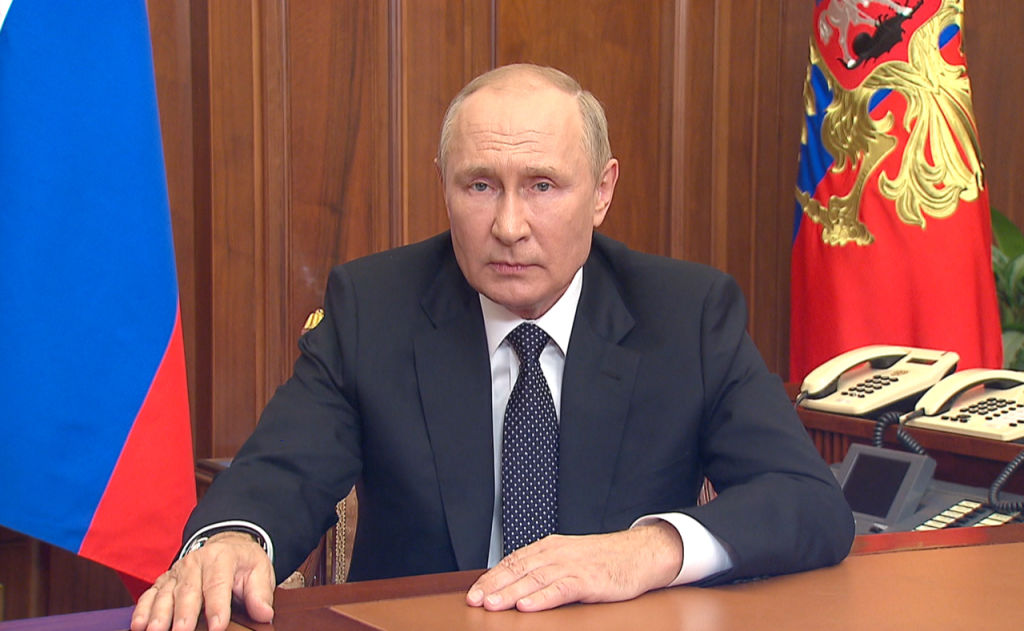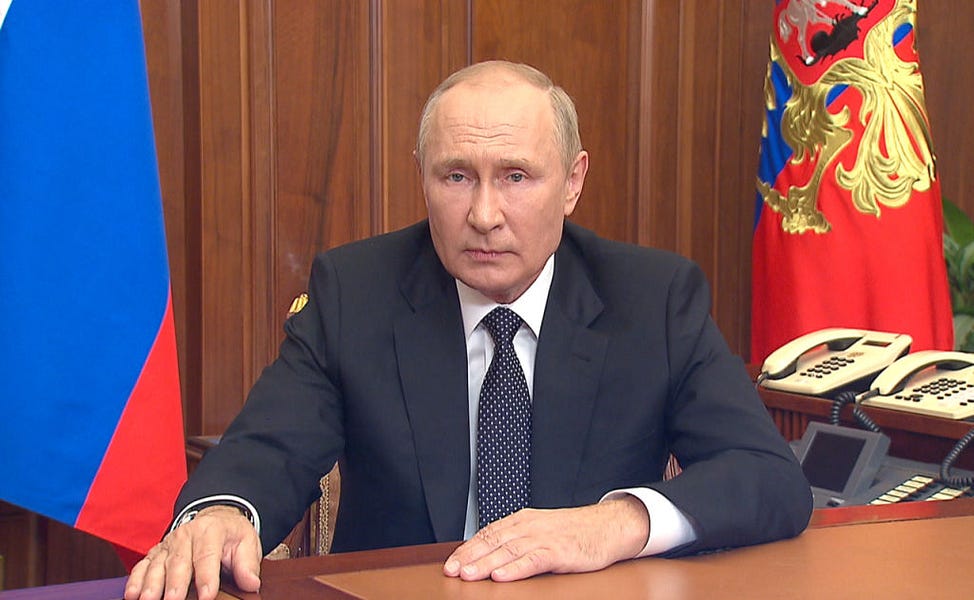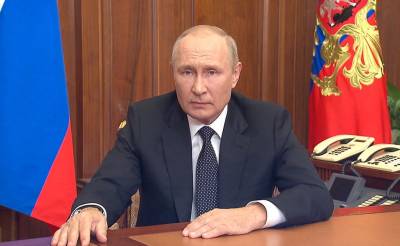Happy Thursday! If you love the taste of tomatoes but have always wished they looked more like plums, we have some great news. Purple tomatoes—recently approved by the U.S. Department of Agriculture—could soon be coming to a grocery store near you!
Quick Hits: Today’s Top Stories
Russia and Ukraine exchanged nearly 300 prisoners Wednesday in a swap mediated by Saudi Arabia and Turkey. Ukraine released 55 Russians and pro-Moscow Ukrainians (including Vladimir Putin ally Viktor Medvedchuk) while Russia released 10 foreigners (including two Americans) and 215 Ukrainians, mostly soldiers captured after the fall of Mariupol.
The German government said Wednesday it will nationalize gas giant Uniper, spending about $8 billion for a 99 percent stake to keep the company afloat and the country’s energy supply stable. Uniper—which reported more than $12.6 billion in losses during the first half of 2022—previously imported most of its gas from Russia, and has taken a financial hit this year as Moscow spiked prices further by throttling supply following sanctions over the invasion of Ukraine.
At least seven Iranians have now died during protests over the death of a young woman in police custody last week, according to human rights watchdog Hengaw. Mahsa Amini was detained for allegedly violating Iran’s dress code, and women have been publicly removing and burning their hijabs in protest, calling for regime change. Authorities have shut down internet access throughout the country, and Iranian President Ebrahim Raisi dismissed Western criticism of Iran’s human rights record while attending the U.N. General Assembly in New York this week.
U.S. Africa Command announced Wednesday that—in coordination with the Somalian government—U.S. forces conducted an airstrike on Sunday against al-Shabaab terrorists who were attacking the Somalian military near Buulobarde, a town in the middle of the country. It was the fifth such reported strike in recent months, and the U.S. believes this one killed 27 al-Shabaab terrorists—and no civilians.
The Federal Reserve’s Open Markets Committee voted unanimously on Wednesday to approve a third consecutive 0.75-percentage-point interest-rate increase, bringing the central bank’s target range for the federal funds rate to between 3 and 3.25 percent and signaling additional hikes are on the way. “We have got to get inflation behind us,” Federal Reserve Chair Jerome Powell said. “I wish there were a painless way to do that. There isn’t.”
The National Association of Realtors reported Wednesday the median existing-home sales price in the U.S. was $389,500 in August—down from a record $416,000 in June, but up 7.7 percent from August 2021—while sales of previously owned homes declined for the seventh straight month, down 19.9 percent year-over-year.
The House voted 229-203 on Wednesday to pass the Presidential Election Reform Act, legislation that would amend the Electoral Count Act of 1887 to stymie efforts—like those of former President Donald Trump—to pressure lawmakers into overturning election results. The bill—which will need to be merged with a slightly different Senate version that has yet to pass the upper chamber—makes clear the vice president’s role on January 6 is purely symbolic, raises the threshold required to object to a state’s electoral votes, and bars state legislatures from retroactively changing election rules after votes have been cast.
West Virginia Attorney General Patrick Morrisey announced Tuesday the state had reached settlements with Walmart and CVS totaling more than $147 million to resolve lawsuits alleging the pharmacies contributed to West Virginia’s opioid epidemic by “failing to maintain effective controls” on distribution of the drugs. A spokesman for CVS argued prescribers and manufacturers are more at fault for the crisis, but said the company agreed to the settlement to put the claims behind them. Walgreens and Kroger did not reach a settlement with the state on similar charges and are set to go to trial next summer.
President Joe Biden announced at the U.N. General Assembly on Wednesday the United States will devote another $2.9 billion toward fighting global food insecurity, building on the $6.9 billion the administration has already pledged this year. The United States Department of Agriculture estimates a near 10 percent increase in global food insecurity in 2022 over 2021, including 42 million more people facing food insecurity thanks to the fertilizer, energy, and food price increases caused by Russia’s invasion of Ukraine.
Hurricane Fiona strengthened into a Category 4 storm on Wednesday, and is forecast to hit Bermuda with tropical storm or hurricane force winds later today. The storm made landfall in Puerto Rico on Sunday, and more than 1 million of the island’s residents still lacked power as of Wednesday, and 450,000 didn’t have reliable water.
The U.S. Court of Appeals for the 11th Circuit issued a ruling on Wednesday granting the Justice Department’s request that investigators be allowed to review documents with classification markings seized from former President Donald Trump’s Mar-a-Lago resort last month. The ruling—reached unanimously by a three-judge panel that included Trump-nominated judges—essentially overturns portions of a previous decision by District Court Judge Aileen Cannon.
In an interview with Sean Hannity on Fox News, Trump asserted the right to declassify documents telepathically. “If you’re the president of the United States, you can declassify just by saying ‘it’s declassified’—even by thinking about it, because you’re sending it to Mar-a-Lago or wherever you’re sending it and there doesn’t have to be a process and there can be a process, but there doesn’t have to be.” Trump also said there is a “lot of speculation” that the FBI searched his property in part “looking for the Hillary Clinton emails.”
Putin’s New Round of Threats

In the exceedingly unlikely event that you’re looking to catch a flight out of Moscow anytime soon, we hope you booked ahead. Russian President Vladimir Putin delivered a speech on Wednesday hinting at nuclear escalation in Ukraine and announcing plans to impose a partial draft, triggering anti-war street protests in Russia and sold out flights as Russians scramble to leave the country.
Coming days after Ukraine’s successful counteroffensive recaptured territory around the major city of Kharkiv—and amid ongoing, well-publicized recruiting problems—Putin’s mobilization of Russian reservists serves as a tacit acknowledgement that Ukraine has been turning the tide against Russian invading forces. Although Defense Minister Sergei Shoigu hinted at the draft being capped at 300,000 troops, Putin didn’t specify a number himself or rule out mass mobilization—leaving open the possibility that Russia will call up as many soldiers as it needs.
The softer announcement is likely a bid to avoid destabilizing political fallout by leaving some ambiguity about who’ll be called up and when. “It’s a case of the Russian government trying to boil the frog slowly,” said Sergey Radchenko, a Russian history professor at the Johns Hopkins School of Advanced International Studies. “It’s not clear who’s going to be drafted, etc. All of that is done in the manner that it’s done [to] minimize public unrest—especially in Moscow.”
But Putin can’t avoid fallout altogether. Security forces stifled anti-war protests that sprang up in the war’s early days, but protesters are now returning to the streets in Moscow, St. Petersburg and elsewhere, denouncing the war and calling for Putin to be sent to the trenches himself. According to independent protest monitor OVD-Info, security forces have arrested nearly 1,500 people. But while it’s too soon to say if they’ll grow, the protests aren’t yet at a scale that could threaten Putin, and they may well peter out like previous anti-war protests. Russia’s parliament on Tuesday passed new laws criminalizing and hiking penalties for draft dodging—along with desertion and surrender—which could help crack down on those one-way flights.
A partial mobilization will help Russian forces with their sheer numbers problem—the Pentagon estimates up to 80,000 Russian soldiers have been killed or wounded in the war thus far—but drafting reluctant citizens is unlikely to improve Russia’s military morale woes. “I’m not sure that many young Russian men are very eager to go fight and die in Ukraine for Putin’s goals,” Thomas Graham, a former Russia-focused National Security Council staffer and a distinguished fellow at the Council on Foreign Relations, told The Dispatch. “They’d rather be doing something else with their lives.” Google searches for how to leave Russia have spiked within the country—as have searches for how to break an arm at home, presumably in order to fail health requirements. And although extra enemy manpower is bad news for Ukraine, the mobilization may flood Russian ranks with ill-trained troops, and it won’t fix the poor leadership and communication that have hamstrung Russian offensive efforts over the last several months.
In addition to his announcement about troop mobilization, Putin also used Wednesday’s speech to unleash thinly veiled nuclear threats, accusing the West of threatening nuclear attacks. “I would like to remind those who make such statements regarding Russia that our country has different types of weapons as well, and some of them are more modern than the weapons NATO countries have,” Putin said, per a translation. “In the event of a threat to the territorial integrity of our country and to defend Russia and our people, we will certainly make use of all weapon systems available to us. This is not a bluff.”
Saying “this is not a bluff” doesn’t mean it’s not a bluff, of course, and Russian officials have made nuclear threats before. But Putin’s comments yesterday were particularly striking because they came shortly after Russian-installed officials in occupied areas of Ukraine announced their regions will hold referenda on joining Russia—votes that are likely to be rigged or coerced. After annexation—which could come soon after the vote closes next week—Putin could declare that Ukrainian attempts to liberate these occupied areas are threats to Russia’s “territorial integrity,” creating a legal pretext justifying a nuclear strike.
If Putin hopes to intimidate the West with the specter of nuclear war, he may be disappointed. “That isn’t going to change attitudes towards the conflict in Ukraine or the level of support for Ukraine at the moment,” Graham argued. “It, I think, simply reaffirms views that people in Europe had about the irresponsibility of Putin’s behavior. So if anything, it’s going to further consolidate public opinion in Europe about the need to push back against Russian aggression in Ukraine and to provide continuing support to Ukraine itself.”
Public statements from Western leaders so far back up Graham’s assessment. NATO head Jens Stoltenberg told Reuters that Putin’s mobilization announcement is evidence that the invasion was a “big mistake,” while Secretary of State Antony Blinken described Putin’s announcement as a reflection of “the Kremlin’s struggles on the battlefield, the unpopularity of the war, and Russians’ unwillingness to fight in it.” And United Kingdom Prime Minister Liz Truss dismissed nuclear threats as a “statement of weakness,” adding, “this will not work.”
Meanwhile, in his speech before the U.N. General Assembly Wednesday, Ukrainian President Volodymyr Zelensky declared that “a crime has been committed against Ukraine” and demanded that the U.N. strip Russia’s privileges in the organization.
“Ukraine wants peace,” Zelensky said. “There is only one entity among all U.N. member states who would say now, if he could interrupt my speech, that he is happy with this war. But we will not let this entity prevail over us, even though it’s the largest state in the world.”
Worth Your Time
In a piece for New York magazine, Andrew Rice and Olivia Nuzzi report on one of the most explosive items of our political era—Hunter Biden’s laptop—and how it’s animated Republicans while paralyzing Democrats. “The present stalemate, in which one side treats the subject with polite indifference while the other side foments and fundraises off it, is unsustainable,” Rice and Nuzzi write. “Maybe it will be broken by the Justice Department, which is reported to be conducting a wide-ranging criminal investigation into Hunter Biden, examining whether he violated various tax, money-laundering, and lobbying-disclosure laws,” they continue. “Even if the DOJ doesn’t bring charges against Hunter, Republicans may gain control of at least one chamber of Congress—and, with it, subpoena power—in November. If they do, they have vowed to start their own investigations.” The implications go far beyond politics. “Whether or not he turns out to be the perpetrator of a crime, [Hunter] is certainly the victim of a violation—an invasion of privacy that is staggering in its totality,” Rice and Nuzzi argue. “Even the people who are responsible for disseminating the laptop admit that, on a human level, what happened to Hunter is horrifying. ‘A lot of stuff I do, I don’t feel great about,’ says one of them, Steve Bannon. ‘But we’re in a war.’”
James Marson has been covering Ukraine for 15 years, as his latest Wall Street Journal piece—on the “ragtag” army that won the battle of Kyiv and turned the tide of the war—makes clear. “[Ukrainians in Kyiv] formed armed groups with whatever weapons they could lay their hands on. They fed and equipped fighters and billeted them in their homes. They shimmied up trees in search of cell phone reception to report on enemy movements,” Marson writes. “The result looked like something little seen in modern warfare—a domestic insurgency fused onto a traditional army. “We are like a hive of bees,’ said Yaroslav Honchar, head of an attack-drone crew who make their own armed craft. ‘One bee is nothing, but a thousand can defeat a big force.’ To a degree not fully appreciated, it was these citizen soldiers, teaming up with active-duty personnel, who turned the tide in the most consequential battle in Europe since World War II and preserved Ukraine’s status as a sovereign nation.”
Presented Without Comment
Also Presented Without Comment
Toeing the Company Line
Reminder, for Dispatch members in the area: David and Steve are kicking off our regional events series tonight at Party Fowl in Franklin, Tennessee. We’re offering three-month free trials to anyone who attends as a guest of a registered member, and an hour-and-a-half of beer, wine and apps. Dress is casual—hope to see you there!
With annual inflation still hovering above 8 percent, why are lawmakers taking steps to boost food and housing prices by implementing additional trade restrictions? “The quartz and produce examples really demonstrate just how crazy things can get in this regard,” Scott writes in this week’s Capitolism (🔒). “Politicians begging for higher food prices and the Commerce Department punishing struggling U.S. homebuilders, right as food and housing prices weigh on the economy and the national psyche.”
Wednesday’s G-File (🔒) starts with a story about a bird pooping on Jonah’s laptop and ends with a George Washington quote about the United States being the “last great experiment for promoting human happiness by a reasonable compact in civil society.” To find out how he got from Point A to Point B, you’re going to have to click through.
On today’s episode of Advisory Opinions, David and Sarah explore why Texas Attorney General Ken Paxton joined an amicus brief in Donald Trump’s Mar-a-Lago case before answering a listener’s follow-up question about last week’s Yeshiva University discussion.
Political economist Nicholas Eberstadt returns to The Remnant today to talk to Jonah about an update to his book examining the collapse of work for men in modern America. Are low topline unemployment rates masking a Great Depression-level crisis for young men? Are we seeing similar trends with women?
On the site today: Price St. Clair explains the history of the U.S.’s policy of “strategic ambiguity” regarding Taiwan and what ending it would mean for U.S. relations with China.. Why is Russia using drones from “a second-rate power like Iran?” It has to do with the complexity of modern drones and Iran’s experience in avoiding sanctions to buy foreign components, Andrew Fink says. Nick Catoggio writes about how “normie” Republicans like Virginia Gov. Glenn Youngkin* and Arizona Gov. Doug Ducey have decided to boost election-denying candidates like Arizona gubernatorial nominee Kari Lake in the midterms. And, last but not least, Kevin Williamson makes his writing debut, arguing that all the talk about high gas prices obscures the fact that what we need is to develop “a more robust, diversified, and secure domestic energy industry.” *Corrected from the original “Maryland Gov. Glenn Youngkin.” We regret the error.
Let Us Know
How much credence do you think U.S. officials should give to the idea that Vladimir Putin could use nuclear weapons in Ukraine? Should the Biden administration go out of its way to avoid provoking/escalating the conflict, or call Moscow’s bluff and continue its support for Ukraine?







Please note that we at The Dispatch hold ourselves, our work, and our commenters to a higher standard than other places on the internet. We welcome comments that foster genuine debate or discussion—including comments critical of us or our work—but responses that include ad hominem attacks on fellow Dispatch members or are intended to stoke fear and anger may be moderated.
With your membership, you only have the ability to comment on The Morning Dispatch articles. Consider upgrading to join the conversation everywhere.